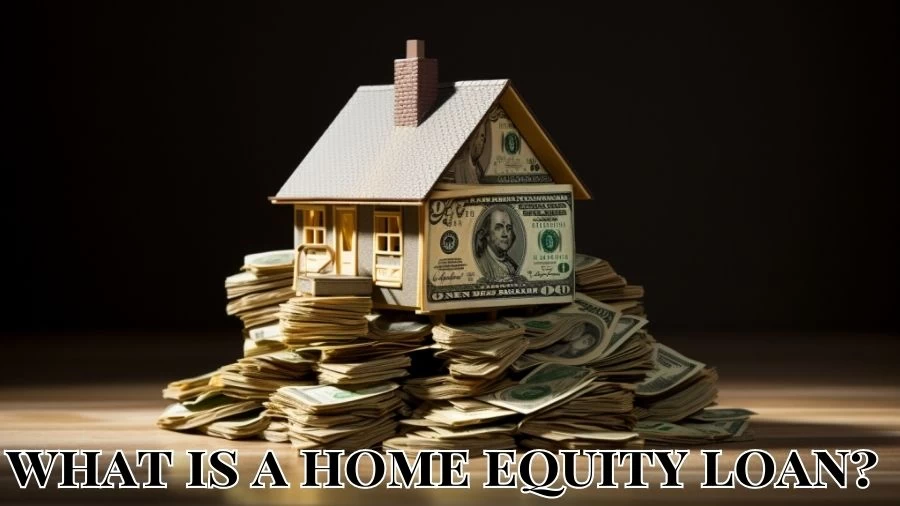
What is a Home Equity Loan? How Does It Work?
A home equity loan provides a lump sum with a fixed interest rate over 5 to 30 years, dependent on credit, payment history, and at least 20% equity, offering liquidity for improvements while considering property value fluctuations.
by Sangamithra
Updated Aug 23, 2023
On This Page
- What is a Home Equity Loan?
- How Does a Home Equity Loan Work?
- How to Get a Home Equity Loan?
- How Long Does It Take to Get Home Equity Loan?
- How Much Home Equity Loan Can I Get?
- What Are Home Equity Loan Rates?
- What Bank Has the Best Home Equity Loan?
- How to Apply for a Home Equity Loan?
- What Are the Advantages and Disadvantages of Home Equity Loans?
- What Are Common Home Equity Loan Eligibility Criteria?
What is a Home Equity Loan?
A home equity loan permits access to your home's equity for a lump-sum payment, repayable at a fixed interest rate over an agreed-upon duration, typically spanning five to 20 years, and potentially up to 30 years with certain lenders. Many lenders necessitate a minimum of 20% home equity, although some accommodate borrowing exceeding 90% of your home's value.
The National Association of Realtors notes that experienced homeowners, who averaged a 17% down payment last year, often qualify for a home equity loan shortly after closing. First-time buyers with an average 6% down payment might encounter a narrower selection of lenders with higher combined loan-to-value (CLTV) limits.
Consistently paying down your mortgage enhances your home equity, and if local real estate values have appreciated since your home purchase, your equity could grow even faster. Property data provider CoreLogic indicates a nearly 16% equity increase among U.S. homeowners with mortgages in 2022. This implies that even those with modest down payments or shorter homeownership durations might be eligible for a home equity loan.
How Does a Home Equity Loan Work?
A home equity loan functions much like a second mortgage, drawing parallels to a conventional mortgage arrangement. The equity inherent in the home serves as a safeguard for the lender. The permissible borrowing capacity for a homeowner is contingent on a composite loan-to-value (CLTV) ratio, which typically ranges from 80% to 90% of the home's evaluated worth.
Naturally, the quantum of the loan and the interest rate applied also hinge on the borrower's credit rating and repayment history. Time-honored home equity loans adhere to a predefined reimbursement period, akin to established mortgages. The borrower submits periodic and fixed payments, encompassing both the principal sum and interest outlay.
Similar to any mortgage contract, failure to settle the loan might lead to the potential sale of the property to address the pending debt. A home equity loan presents an effective avenue for converting accrued home equity into liquid resources, especially if these funds are channeled into property enhancements that amplify the home's valuation.
Nevertheless, it's imperative to always bear in mind that you're placing your property in a vulnerable position—depreciating real estate values could result in a scenario where your obligations surpass your home's actual value. In the event of contemplating a relocation, there's a possibility of incurring losses upon selling the home or encountering obstacles in the process.
If the intention behind obtaining the loan is to settle credit card debts, it's crucial to resist the enticement of accumulating new credit card expenditures. Prior to undertaking any action that jeopardizes your property, carefully evaluate all potential alternatives.
How to Get a Home Equity Loan?
To initiate the process of obtaining a home equity loan, adhere to these steps:
Evaluate Your Credit: Prior to applying for a home equity loan, it's prudent to assess your credit standing. Lenders gauge your creditworthiness and determine interest rates based on your credit. A credit score of around 620 is generally a baseline requirement. Although some lenders may consider lower scores, expect potentially higher interest rates. In such cases, you might need to showcase higher income and more equity to secure approval.
Research Lenders and Opt for a Choice: Engage in thorough research, comparing multiple lenders to discover a loan that aligns with your needs. Start by reaching out to your current lender, but do explore alternative options we've previously outlined. Keep in mind that fewer lenders offer home equity loans compared to HELOCs. After your research, select the lender that best suits your preferences.
Complete the Application: Once you've chosen a lender, proceed to fill out a comprehensive application. Be prepared to submit necessary documents such as tax returns or pay stubs, as required by the lender.
Receipt of Funds: Upon approval, the lender will guide you through the signing process, allowing the release of the loan funds to you. Typically, the duration from application to finalizing the loan, referred to as the closing process, can span from two weeks to as long as two months.
Following these steps diligently can facilitate a smoother and more efficient home equity loan application process.
How Long Does It Take to Get Home Equity Loan?
The timeframe for finalizing a home equity loan varies based on multiple factors. Generally, your level of preparation significantly impacts the speed of closure. Ensuring you possess all the necessary documents required by your lender prior to applying accelerates the process.
Regrettably, other variables like the timing of the property appraisal and the underwriting procedure fall outside your control. If your financial circumstances are straightforward, the underwriting phase is more likely to proceed swiftly. Conversely, if the involvement of an attorney is necessary during the closing, the pace hinges on their availability, potentially leading to delays.
In an optimal scenario, wrapping up a home equity loan could occur within a few weeks. Nonetheless, it's not uncommon for this journey to extend to around two months.
How Much Home Equity Loan Can I Get?
The borrowing capacity of a home equity loan is determined by factors such as your property's value, the lender's criteria, and your financial profile. Generally, lenders use the CLTV (Combined Loan-to-Value) ratio, which assesses the loan amount against your home equity. For instance, if a lender has an 80% CLTV limit and your home is worth $300,000, you might borrow up to $240,000, subtracting your outstanding mortgage balance.
However, eligibility also considers employment history, income, and credit score. A lower credit score could impact your loan amount and interest rate. Thus, your borrowing potential is a blend of property value, CLTV ratio, and financial standing.
What Are Home Equity Loan Rates?
Interest rates for home equity loans exhibit substantial diversity depending on the lender and the specific product. In broad terms, home equity lines of credit (HELOCs) tend to initiate with lower interest rates compared to home equity loans. However, these rates within HELOCs are variable and can change over time.
In contrast, home equity loans maintain a fixed interest rate structure, ensuring that the rate you secure remains consistent throughout the loan's duration. At present, the average interest rate for home equity loans stands at approximately 8.57 percent. This highlights the dynamic nature of interest rates within this lending domain, reinforcing the significance of careful consideration when selecting between various lending options.
|
Loan Type |
Average Rate |
Average Rate Range |
|
Home equity loan |
8.57% |
7.97% - 9.84% |
|
10-year fixed home equity loan |
8.71% |
7.84% - 9.81% |
|
15-year fixed home equity loan |
8.68% |
7.86% - 10.68% |
What Bank Has the Best Home Equity Loan?
Premier home equity loan providers present an array of repayment options, competitive interest rates, and minimal fees. Ascertaining the optimal offer requires exploring diverse lenders due to their distinct eligibility assessments. Factors such as credit score, income, property equity, and more influence your interest rate.
The most favorable rates are extended to borrowers with excellent creditworthiness. Pioneering lenders take individual criteria into account, making thorough comparisons essential to secure the finest terms for your home equity loan.
|
Loan Type |
Loan Amount |
Loan Term |
Starting APR |
|
Discover |
$35,000–$300,000 |
10 to 30 years |
6.24% (1st lien) |
|
BMO Harris Bank |
$25,000–$150,000 |
5 to 20 years |
8.74% |
|
KeyBank |
$25,000–$250,000 |
1 to 30 years |
9.28% (1st lien) |
|
Spring EQ |
Up to $500,000 |
Not specified |
Not disclosed |
|
Flagstar Bank |
$10,000–$1,000,000 |
10 to 20 years |
8.04% |
|
U.S. Bank |
$15,000–$750,000 |
Up to 30 years |
8.00% |
|
Third Federal Savings and Loan |
$10,000–$200,000 |
5 to 20 years |
6.49% |
|
Frost Bank |
Starting at $2,000 |
7 to 20 years |
7.13% |
|
Connexus Credit Union |
Starting at $5,000 |
5 to 20 years |
9.25% |
|
Regions Bank |
$10,000–$250,000 |
7 to 20 years |
6.25% |
How to Apply for a Home Equity Loan?
Applying for a home equity loan involves several steps:
- Eligibility Check: Ensure you meet the lender's criteria, such as credit score, income stability, and equity in your property.
- Research Lenders: Explore various lenders to find the best terms and rates for your needs. Consider both traditional banks and online lenders.
- Gather Documents: Prepare necessary documents like proof of income, employment history, tax returns, and property valuation.
- Loan Application: Complete the application provided by your chosen lender. This involves sharing personal, financial, and property information.
- Appraisal and Underwriting: The lender may order an appraisal of your property to assess its value. Underwriting involves reviewing your application and documents.
- Loan Approval: Once approved, you'll receive a loan offer with terms, conditions, and interest rates.
- Review and Acceptance: Carefully review the loan offer, including interest rates, repayment terms, and fees. Accept the offer if it aligns with your needs.
- Closing: Schedule a closing appointment with the lender to finalize the loan. Sign the necessary documents and pay any closing costs.
- Disbursement: After closing, the lender will disburse the approved loan amount, usually in a lump sum.
- Repayment: Make regular payments over the agreed term, covering both principal and interest.
Before proceeding, thoroughly understand the terms, assess your ability to repay, and consider consulting a financial advisor to ensure a home equity loan is the right choice for your financial situation.
What Are the Advantages and Disadvantages of Home Equity Loans?
Home equity loans offer a range of advantages, but they also come with certain drawbacks.
The advantages and disadvantages are as follows:
Advantages of Home Equity Loans:
- Home equity loans provide a convenient source of cash and prove valuable for responsible borrowers.
- Borrowers with a steady income and repayment plan can benefit from the combination of low-interest rates and potential tax deductions.
- The simplicity of secured debt makes obtaining a home equity loan straightforward, involving a credit check and home appraisal.
- While home equity loans have higher rates than primary mortgages, they offer substantially lower rates compared to credit cards and various consumer loans.
- These loans are particularly advantageous when specific, larger financial goals such as home renovations or education expenses need funding.
Disadvantages of Home Equity Loans:
- One significant downside is the potential for borrowers to fall into a cycle of recurring spending and borrowing.
- The "reloading" pattern, where loans are used to pay off existing debts and secure additional credit, can result in escalating debt and reliance on loans.
- Loans exceeding 125% of home equity carry higher fees and lack full collateral, as they surpass the home's value.
- Interest paid on the portion of the loan exceeding the home's value is not tax deductible.
- The availability of a single payout during the application process can tempt borrowers to borrow more than immediately needed.
- Overborrowing could lead to financial strain and, in severe cases, bankruptcy or foreclosure.
What Are Common Home Equity Loan Eligibility Criteria?
Home equity loan prerequisites can differ among lenders, yet they universally seek responsible, low-risk candidates.
Typically, the following criteria are commonly anticipated by most lenders:
- Credit Score: A credit score of around 620 is often sought, although certain lenders might mandate a minimum of 680.
- Stable Income: Demonstrating a consistent and sustainable income from the previous two years is a fundamental requirement.
- Equity Threshold: Possessing at least 80% equity in your property constitutes a common baseline.
- Debt-to-Income Ratio: A debt-to-income (DTI) ratio not exceeding 43% is frequently a parameter to fulfill.
- Strong Financial History: An exemplary financial track record is generally anticipated.
- Homeowners Insurance: Furnishing proof of homeowners insurance typically forms part of the application process.
What is a Home Equity Loan - FAQ
1. What is a home equity loan's repayment period?
Repayment periods for home equity loans typically range from 5 to 30 years.
2. Can first-time buyers qualify for home equity loans?
Yes, though eligibility varies, first-time buyers with higher down payments might have access to more lenders.
3. How fast can I get a home equity loan?
The process usually takes a few weeks to a couple of months, influenced by factors like documentation and property appraisal.
4. What affects home equity loan rates?
Home equity loan rates are influenced by factors like credit score, loan term, and current market conditions.
5. Are home equity loan interest rates fixed?
Yes, home equity loans generally offer fixed interest rates, maintaining consistency throughout the loan term.




